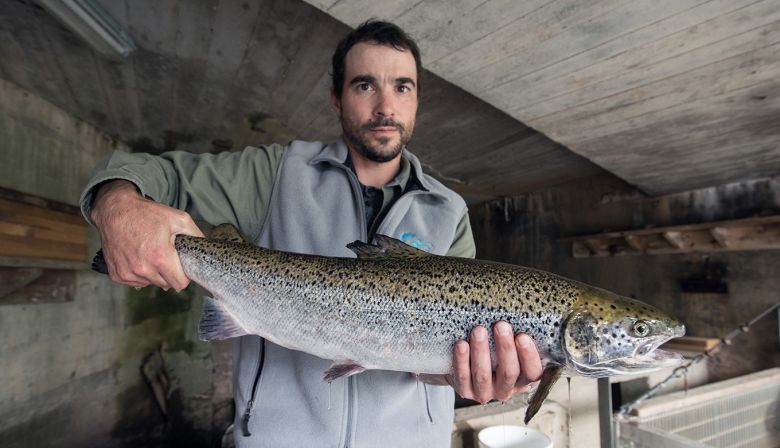
Subscribe & stay up-to-date with ASF


The old adage ‘you are what you eat’ needs an update. It should be ‘you are what you eat, eats’. Modern food production methods have changed the nutritional quality, genetics and environmental impacts of most protein sources versus their natural origins. Let’s focus on salmon.
This iconic fish is usually pictured leaping up treacherous rapids to spawn another generation which will roam thousands of miles at sea before returning, perhaps multiple times, to its river of birth. Anyone who has had the good fortune to cast a fly in pursuit of this king of fish can have nothing but respect for this vibrant, muscle-bound species’ fight for survival.
But when you show up at your local seafood vendor or choose a salmon dish from a restaurant menu, what you are likely getting is a remote cousin to its wild counterpart. It may, in fact, represent a deadly enemy to salmon’s survival. Salmon aquaculture—or salmon farming in cages in coastal areas sheltered from the ravages of the open ocean—started in Norway in the 1970s. It has since burgeoned into a globally important industry producing literally millions of tons of “salmon” a year. But at what cost?
Salmon farms have been unable to prevent caged fish from escaping. This is usually a function of severe weather events but can also occur because of human error and poor cage integrity. We now know, for a scientific fact, these fish then in-breed with their wild cousins, thereby exposing them to diseases previously unknown to the species, reducing their fitness and productivity strength. Ultimately, this can lead to the extinction—yes, the extinction—of wild salmon in river systems proximate to aquaculture activity. The Department of Fisheries and Oceans has acknowledged that Newfoundland’s Conne River, which once supported a run of 10,000 fish a year and is now down to 200, is a prime candidate for local extinction.
The counter argument is that salmon aquaculture brings valuable jobs to communities where economic opportunities are lacking. This is precisely the predicament facing the Conne River First Nations Band. Many Band members have secured work in local fish farms; the Band and its members have investments in support activities related to the industry. You can imagine the difficult debate within the Miawpukek First Nation.
In British Columbia, the interaction of First Nations communities with local salmon activity has led to aggressive lobbying to, in some instances (not all), ban at-sea farming. The Feds have complied by ordering a shut-down in favour of land-based farming.
Beyond the threat salmon farming poses to the survival of its wild counterpart, salmon farming as currently practiced is not sustainable. You can’t grow fish without feeding them, at least in part, fish. Wild salmon eat baby shrimp, capelin and most importantly algae, things which are rich in oils, particularly omega 3 oils. That’s why wild salmon are an important source of essential fatty acids and omega 3s. Farmed fish don’t get that diet. Instead, they get the cheapest protein-based diet, mostly soy based, to which is added fish meal and/or fish oils. Next time you see a piece of farmed Atlantic salmon, check out the white lines running through the flesh (which, by the way, is artificially coloured to make it look like “real” salmon). These are lines of fat which occur both as a function of the artificial diet and the difference in exercise for farmed fish versus its wild cousin. And don’t forget the antibiotics fed to these caged sources of soy protein. I know, just what you wanted.
Our government’s science community is increasingly concerned about the environmental costs of salmon aquaculture as it is currently carried out on the south coast of Newfoundland (and for that matter the southwest coast of Nova Scotia and the south coast of New Brunswick). What is particularly concerning are the industry’s plans to expand to areas west of where they now operate, where currently pristine rivers support healthy populations of wild fish. How can this be reconciled with the federal government’s new Blue Economy Strategy? The North Atlantic Salmon Conservation Organization, of which Canada is a member, has already called us out for failing to meet our international commitments. This is a disgrace, and we should be embarrassed as a nation.
We desperately need an open and informed debate. We need to hear from our scientific community as to the real costs of this new industry. We need to better understand the relationship between jobs, economic activity and the goals of sustainability and socially responsible behavior. If the outcome of the debate is to allow further expansion of the industry, then at least we’ve had the discussion and we understand the consequences. But no expansion should be allowed until that debate has been had.
The next time you look at a cosmetically appetizing piece of farmed salmon, consider the real costs and the arguments, on all sides.